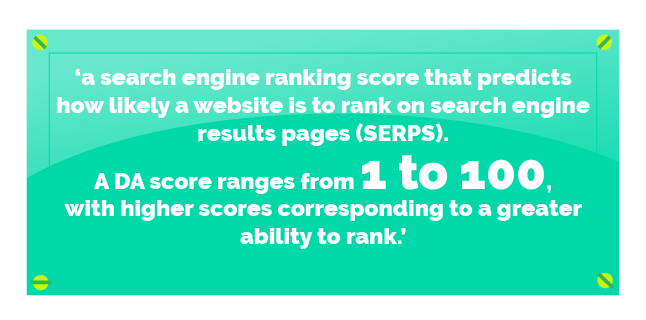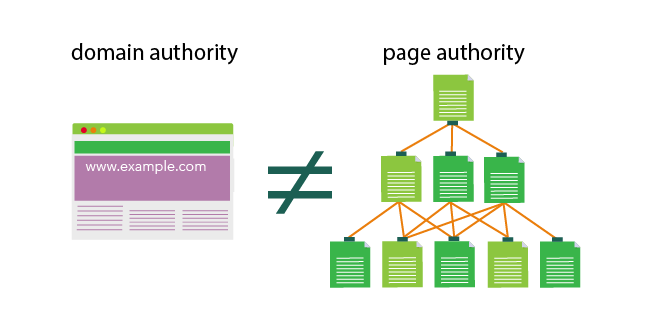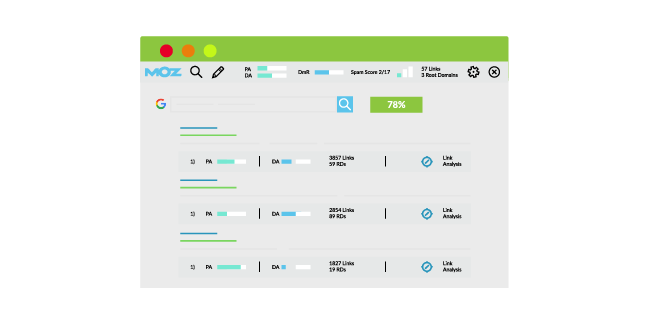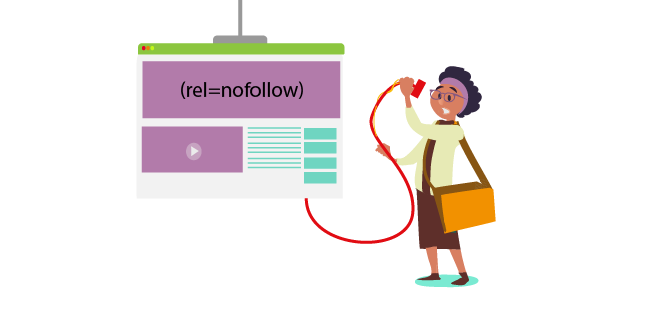There’s no denying it, SEO is a pretty complex process. And domain authority is one way to help us understand it.
There are over 200 ranking factors used by Google to determine where a website ranks on a list of search engine results pages. So it can be hard to identify where exactly your strengths and weaknesses lie within your own SEO strategy. And, what you need to do to improve it.
Over the years, many third-party SEO sites have tried to simplify the process. They’ve helped businesses to understand which areas of their website they need to improve in order to rank highly.
One site which has turned pretty mainstream with theirs is Moz. This SEO giant created the ‘Domain Authority’ score. And, it’s designed to help businesses understand how relevant their website is amongst their competitors in terms of SEO.
Providing a score between 1 to 100, Moz’s domain authority calculates over 40 different ranking factors. These are used to predict how well they think a website will rank on search engine results pages.
Following is a detailed guide in which you will learn everything you need to know about domain authority. Including how to check your own.
What is Domain Authority (DA)?
Developed by the SEO software company Moz, domain authority is defined as:

With over 200 factors affecting a website’s rankings, the domain authority evaluates a small portion of these (40 to be exact). It then simplifies their ranking potential into one easy DA score. This score makes it easy to compare websites against their competitors, as well as track its progress over a length of time.
The ranking signals include the number of linking root domains, the total number of backlinks a website has, and the strength of those links.
Essentially, any external links coming to your website will have a big influence on your score.
The Difference Between A Domain Authority (DA) and Page Authority (PA)

As the name suggests, Page Authority is a score that predicts how well a specific page will rank.
Unlike the domain authority which scores the overall domain (e.g. www.example.com), the Page Authority will score every single page. If it’s within a website’s sitemap (everything that comes after the main domain – e.g. www.example.com/page-one or www.example.com/checkout) then it will be scored.
How to Determine a ‘Good’ Domain Authority
Unfortunately, there is no set score which determines whether a site’s domain authority is good or bad. Instead, it should be considered specific to your site and its closest competitors.
For example, take a website like Wikipedia. Wikipedia is a high-profile brand and website, it benefits from millions of page views and a high-quality backlink profile. As well as lots of other factors which promote positive search engine rankings.
As a result, Wikipedia has a high DA score of 93. And one which many small or new websites will struggle to compete against. 
Instead of aiming for a high DA score, websites should look at the scores of their competitors. Then, aim to outrank them instead. After all, you only need to beat your direct competitors in your field to be at the top of Google.
By using the DA as a comparative tool rather than a score you need to achieve, you’ll be able track your website’s performance against your closest competitors. Especially important as you implement your content marketing and SEO strategy.
Domain Authority Does Not Always Correlate to High Rankings
It’s important to note that Google’s page rankings and Moz’s domain authority are two separate entities. And one does certainly not directly affect the other.
With domain authority being a third-party development, Moz’s software doesn’t have access to the same metrics as Google. Which uses its own complex search algorithms. And this can lead to discrepancies between Moz’s DA score and Google’s ranking positions of websites.

In addition to this, when Google determines where a page should rank, they consider over 200 factors. Whereas Moz’s domain authority score only accounts for 40 different factors, which focus primarily on a page’s link profile.
Therefore, you should never assume that just because you have a domain authority you’re going to automatically have high page rankings and vice versa.
In fact, it’s very common for sites with low domain authorities to rank higher than larger more established sites. This is in part thanks to more organic opportunities over recent years, like featured snippet boxes and PAA question boxes.
So, as great as it is to use your DA as a comparative tool, and one which helps you to improve your website, you should never use it as the sole reflection for how well your SEO is performing.
How Do I Check My Website’s Domain Authority?

Despite being a premium service which most brands pay to use, Moz have also created some free but limited services. These allow you to view a website’s domain authority.
The most popular and easiest tool to use is with Moz’s free extension for search engines, known as the Mozbar. This toolbar sits at the top of any website you visit and shows its DA score. It also gives you the Page Authority score, as well as how many backlinks that page has.
But, if you don’t want to install the free Mozbar extension, you can also measure a website’s DA with their other free Keyword Explorer or Link Explorer tools.
How Do I Improve My Domain Authority?
Once you have a good understanding of what domain authority is and how it can be improved, it’s a good idea to work towards increasing your score. Afterall, your domain authority score is all about how competitive a website is in a Google search.
So, by improving your domain authority, you’re also increasing your chances of improving your search engine ranking.
Here’s 5 ways on how you could improve yours:
1. Increase the number of links coming to your website
Increasing the number of external links to your website is essential. And it’s one of the factors which will affect your DA score the most.
Also known as backlinks, these links are inferred by search engines to determine how relevant your content is.
A search engine will see that other websites consider your content worth sharing and linking to. Then, it will assume that your content is of high-quality. And definitely worth being displayed in a page of search engine results.

So, you want to try and increase the number of quality links coming to your website. That way, you’ll start to improve your DA score.
I stress the importance of quality here. As important as backlinking is for SEO, you need to be mindful as to how you build links.
When interpreting your backlinks, Google will look at those websites’ relevancy, trustworthiness and their own domain ratings. If those websites are deemed low-quality or untrustworthy, then Google will also consider your site to be low-quality too.
After all, why would a high-quality website ever want to link to something which is considered below par?
So, when you start to build your number of backlinks, always check for the website’s DA score. Especially before reaching out to them.
If it’s a similar rating or higher than yours, then great!
But if it’s a score lower than your own, you want to block any link coming from them. As websites with low DA scores linking to your site can harm your own domain authority.
And before even considering it, never try to use any shortcuts. Avoid buying links for the sole purpose of gaining links. These strategies are frowned upon by search engines. Because they’re not a direct reflection of the quality of your content.
Backlinks should be seen as a badge of honour for websites. Reserved only for those that take the time and effort to create high-quality content. If you’re cheating your way to the top, you will be penalised by the search engines.
2. Remove bad links

As mentioned above, along with increasing the number of links coming to your website, you also want to be wary of any bad links pointing your way.
This is because links are seen as the cheerleaders for your website and its content. If a low-quality site is linking to yours, then search engines will assume your content isn’t worth being viewed.
It’s very easy to monitor your backlink profile. And there are a number of cost-effective tools available which can do these for you, including Moz’s Link Explorer tool. Tools like these can monitor and alert you of any low-quality sites which are linking to your website.
Sometimes you can find yourself with a backlink from a low-quality or spam website. And you don’t want to be associated with it.
Fortunately, by tagging these links with a small piece of HTML code (rel=nofollow), you can tell search engines to ignore them. So when crawling your site’s link profile, they will avoid these particular links.
Then, when it comes to your website’s rankings, links with a nofollow tag will have no influence on your results.
3. Diversify your link profile

As easy as it may be to obtain lots of links from one or two external websites, avoid doing so. You should always strive to diversify your link profile and gain links from a variety of sources.
Root domains are one of the factors which Moz takes into account when formulating your DA score. And so having a variety of quality domains within your profile will put you in a great place to score high.
When looking to increase your number of backlinks, always strive for diversity in where they are coming from.
For instance, a range of links from different sites such as news sites, reference pages, directories and blogs. This will go a long way to making your profile more diverse.
And, on top of strengthening your domain authority, by diversifying your backlink profile, you’ll also be increasing your visibility. Your chances of being seen by more searchers will grow, as your content will feature on a whole range of different websites.
4. Focus on your internal link structure
As great as backlinking is for your website’s SEO, you can also strengthen your overall domain authority by improving your internal linking structure.
Internal linking allows you to distribute various page authorities (or ‘link juice’). As well as their ranking power throughout the site to strengthen your overall domain.
Link juice is a casual term used within SEO to describe the passing equity or ‘ranking power’ of a page. This equity is a key factor in helping your webpage to rank highly in a page of search results.

And this strategy can be particularly beneficial if you have one or more pages with a high PA score. Here, you can distribute this strong link juice from this page onto other pages you’d like to give a boost.
So, say for instance you have a blog which ranks highly for a particular search term. You should include a link on this blog post which connects it to other pages on your website. For example, a particular product page, a contact page or even your homepage.
By distributing the link juice in this way, you’ll increase the page authority on a few of your pages. And the more pages you have with a high PA, the stronger your overall DA will become.
Unlike backlinking, improving your site’s internal linking structure is a much speedier process, as it involves no external outreach.
It will also improve the user experience. As it helps them to navigate around your site with ease via your conveniently placed links.
Tip: Focus on your users’ experience, not your DA score
It’s important to note that despite these being the most obvious areas to focus your energies on, they may not work for every website. Domain authority scores are influenced by over 40 different ranking factors. And it’s the combination of all of these which determine your score.
Instead of trying to focus solely on improving your domain score, I would instead advise that you focus on improving your website’s usability for visitors.
At the end of the day, it’s your audience that will determine how well your pages rank. Once you start to shift your energies to improving their user experience, you’ll start noticing a difference. As you’ll be unknowingly improving your overall ranking potential.
What does this mean?
Well, it means doing everything you can to improve the experience for those coming to and spending time on your website.
Not only does this mean creating quality, relevant content which addresses their needs. But it also means ensuring your website is properly optimised for SEO. As a result, a site user’s journey from start to finish will run smoothly.
Conclusion
Domain authority is a great metric to look at. Especially for websites looking to simplify the SEO ranking process. And for those who want to understand how they compare against their direct competitors.
By offering one specific score that accounts for over 40 different ranking factors, it saves time. Plus, it also saves marketers the headache of trawling through their website’s entire SEO strategy. And then spending even longer evaluating what is and isn’t working.
With domain authority scores weighing heavily on a website’s internal and external link structure, it’s important.
And there are a few straightforward tactics you can implement to improve your score.
For instance, increasing the number of high-quality backlinks your website has. Or strengthening your site’s overall domain with a robust internal link structure.
However, with links dominating the DA score, marketers need to remember to take caution when using it as a metric.
As a comparative tool, it’s great. You can see how you stand against your competitors. Plus, you use it to track your site’s progress over a period of time.
But you must always remember that it is a third-party metric and completely separate to Google’s own ranking algorithm. And a high DA does not always correlate to high page rankings.
Instead, as with anything in SEO, if you want to increase your domain authority and rankings, you should strive to improve your website’s overall usability. Therefore, creating a better experience for your audience.
After all, they’re the ones who are really going to influence how successful your website is in the end.
Outsourcing Your SEO to a Marketing Consultant
As easy as it may be to track and implement the tips listed above, it is a significantly time-consuming process.
Backlinking aside for one moment, the process of researching and creating your content takes a huge amount of time to do properly. Time, which, many small businesses and new start-ups don’t have. Especially not to dedicate to one single marketing strategy.
Instead, many people turn to a marketing consultant such as myself. One who can focus on creating and delivering an SEO strategy that works for your brand.
With over 10 years’ experience within the digital marketing industry, my team and I know exactly what it takes to help your website meet its goals.
If you would like to hear about how we can help you with your SEO and content marketing, get in contact. I’d be happy to have an obligation-free chat and talk you through some of our previous work.







